Czech Beer, Breweries and Beerhalls
By Tracy A. Burns
The History of Czech Beer
Dating back to the 10th century, Czech beer maybe even more popular and more well-known than the Charles Bridge or Prague Castle. It comes as no surprise that the Czech Republic has the highest beer consumption per capita in the world. Indeed, tourists and locals alike savor the unique tastes of Czech brews that in medieval times were considered medicines for various diseases.
The first news about manufacturing beer in the Czech lands harkens back to 993 when Benedictines made beer at Prague’s Břevnov Monastery. The oldest document concerning growing hops in the Czech lands was scribed in the 11th century. The city of Brno was brewing tasty concoctions as far back as the 12th century. In 1295 King Wenceslas II (Václav II) founded the city of Pilsen (Plzeň)and asserted that every individual had the right to make beer, and České Budějovice gained this privilege as well. Monasteries had their own breweries, and Saint Wenceslas (Václav) was designated the patron saint of beer. In fact, the Saint Wenceslas Agreement ( Svatováclavská smlouva) from 1517 set down specific rules for making beer, and the laws were in effect until 1869.
From the 16th to the 18th century, 36 malthouses and 26 small-town breweries dotted Pilsen alone. At the end of the 18th century, beer underwent a drastic change in the Czech lands. Breweries started to use barley and hops instead of wheat as ingredients in the beverage. Then, in 1837, Czech beer earned more recognition abroad: Pilsner Prazdroj and Pilsen town brewery (Mešťanský pivovar) nabbed the highest prize, the grand prix, at an international exhibition in Paris.
Pilsner Urquell
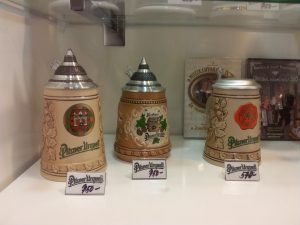 Four years before Pilsner Urquell was invented, 36 barrels of bad beer were discarded in front of Pilsen’s town hall. The following year the decision to build a new brewery was announced, and soon German beer expert Josef Groll became the head brewer. Inspired by Bavarian lagers, Groll invented Pilsner Urquell on October 5, 1842, and he is largely responsible for the superb, current taste of Czech light lager. A golden Pilsner beer made history by becoming the first light-colored beer in the world. In 1856 Pilsen beer was introduced abroad, and exported to Vienna by train every day. By 1874 the beer was even drunk in the United States. In 1880 the larger grabbed first prize at an international exhibition in Brussels. At the very end of the 19th century, the Prazdroj-Urquell name came into existence. At Prague’s Jubilee Exhibition in 1891, the Pilsen town brewery grabbed first place. The volume of production reached a million hectoliters in 1913. Thirty-four countries offered the tremendously popular brand, and Pilsen brewery proved the biggest in Europe.
Four years before Pilsner Urquell was invented, 36 barrels of bad beer were discarded in front of Pilsen’s town hall. The following year the decision to build a new brewery was announced, and soon German beer expert Josef Groll became the head brewer. Inspired by Bavarian lagers, Groll invented Pilsner Urquell on October 5, 1842, and he is largely responsible for the superb, current taste of Czech light lager. A golden Pilsner beer made history by becoming the first light-colored beer in the world. In 1856 Pilsen beer was introduced abroad, and exported to Vienna by train every day. By 1874 the beer was even drunk in the United States. In 1880 the larger grabbed first prize at an international exhibition in Brussels. At the very end of the 19th century, the Prazdroj-Urquell name came into existence. At Prague’s Jubilee Exhibition in 1891, the Pilsen town brewery grabbed first place. The volume of production reached a million hectoliters in 1913. Thirty-four countries offered the tremendously popular brand, and Pilsen brewery proved the biggest in Europe.
In 1919 the brewery was modernized, but the future held trials and tribulations. On April 17, 1945, 111 bombs fell on the town brewery. It rebounded, though, but in 1946 both Pilsen breweries were nationalized. Pilsen beer continued to win medal after medal in competitions. From 1965 the Pilsen brewery manufactured more than one million hectoliters of beer. In 1990 the brewery was given a new, modern look, and cylindrical tanks were installed. The beer received a gold medal at the 1991 international exhibition in Brussels. Now Plzenský Prazdroj sells more than 9.9 million hectoliters annually and is represented in more than 50 countries. It includes the Czech beers Pilsner Urquell, Master, Gambrinus, Velkopopovický Kozel, Radegast, Birell, Primus, Klasik, and Frisco and operates four breweries in the Czech Republic.
Budějovický Budvar
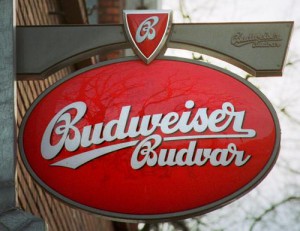 In the early 19th century, the town of Ceské Budějovice had mostly German inhabitants, and they ran the Budějovický town brewery, founded in 1795. However, the Budějovický Budvar brewery was a Czech enterprise, established in 1895. Until the end of 1896, it had a volume of 51,000 hl produced while currently, its volume of production reaches to more than a million hectoliters. The beer made a name for itself abroad by 1913. During the interwar period, the brewery got a modern makeover. In the 20th century, this brand received even more worldwide recognition, becoming known on all continents. It officially took the name of Budvar in 1930. After being under Nazi control and then nationalized by the Communists, the brewery was returned to private ownership following the 1989 Velvet Revolution. Some of its newer beers include a dark lager of Budweiser Budvar, a new light draft beer called Párdel, and an 11 percent lager called Párdel Echt. It also imports the Danish beer Carlsberg.
In the early 19th century, the town of Ceské Budějovice had mostly German inhabitants, and they ran the Budějovický town brewery, founded in 1795. However, the Budějovický Budvar brewery was a Czech enterprise, established in 1895. Until the end of 1896, it had a volume of 51,000 hl produced while currently, its volume of production reaches to more than a million hectoliters. The beer made a name for itself abroad by 1913. During the interwar period, the brewery got a modern makeover. In the 20th century, this brand received even more worldwide recognition, becoming known on all continents. It officially took the name of Budvar in 1930. After being under Nazi control and then nationalized by the Communists, the brewery was returned to private ownership following the 1989 Velvet Revolution. Some of its newer beers include a dark lager of Budweiser Budvar, a new light draft beer called Párdel, and an 11 percent lager called Párdel Echt. It also imports the Danish beer Carlsberg.
Velkopopovický Kozel
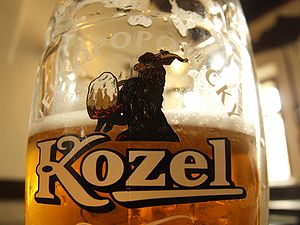 The Popovice brewery in Velké Popovice hails all the way back to the 16th century when it was in private ownership. After the Thirty Years’ War, it belonged to several monasteries. When the laws of Holy Roman Emperor Joseph II were abolished in the late 18th century, the brewery became the property of František Ringhoffer, the mayor of Prague’s Smíchov district. He constructed a new brewery with modern machinery. The historic first brew of Velkopopovický Kozel came in 1874. This larger reached a volume of production of 90,000 hl shortly after the beginning of the 20th century. During World War I the brewery was shut down, but then made a comeback. Yet it was to suffer another major setback. When the Nazis annexed the Sudetenland, the brewery found itself without raw materials. The place was nationalized in 1945 and privatized in 1991. During 1994, it achieved a record-breaking volume of production of 931,000 hl.
The Popovice brewery in Velké Popovice hails all the way back to the 16th century when it was in private ownership. After the Thirty Years’ War, it belonged to several monasteries. When the laws of Holy Roman Emperor Joseph II were abolished in the late 18th century, the brewery became the property of František Ringhoffer, the mayor of Prague’s Smíchov district. He constructed a new brewery with modern machinery. The historic first brew of Velkopopovický Kozel came in 1874. This larger reached a volume of production of 90,000 hl shortly after the beginning of the 20th century. During World War I the brewery was shut down, but then made a comeback. Yet it was to suffer another major setback. When the Nazis annexed the Sudetenland, the brewery found itself without raw materials. The place was nationalized in 1945 and privatized in 1991. During 1994, it achieved a record-breaking volume of production of 931,000 hl.
U Medvíků Microbrewery (Na Perštýně 7, Prague 1)
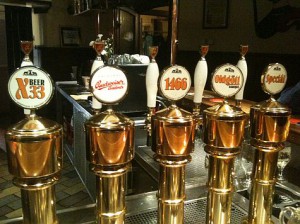 This popular microbrewery in Prague traces its roots back to the 15th century and was named after one of its owners, Jan Medvídek. In the 1950s it was nationalized, and the building remained decrepit even in 1989. When the brewery was returned to private ownership, it was modernized and extended. A hotel was even added. Today it is the smallest restaurant brewery in the country with maximum volume production of 300 hl. U Medvíků features the light lager 1466, brewed on the premises and containing 6.1 percent alcohol, the semi-dark 13 percent Oldgott with 5.2 percent alcohol, and X Beer 33, the strongest lager in the world with 12.6 percent alcohol, brewed once a month.
This popular microbrewery in Prague traces its roots back to the 15th century and was named after one of its owners, Jan Medvídek. In the 1950s it was nationalized, and the building remained decrepit even in 1989. When the brewery was returned to private ownership, it was modernized and extended. A hotel was even added. Today it is the smallest restaurant brewery in the country with maximum volume production of 300 hl. U Medvíků features the light lager 1466, brewed on the premises and containing 6.1 percent alcohol, the semi-dark 13 percent Oldgott with 5.2 percent alcohol, and X Beer 33, the strongest lager in the world with 12.6 percent alcohol, brewed once a month.
U Fleků Microbrewery
(Křemencova 11, Prague 1)
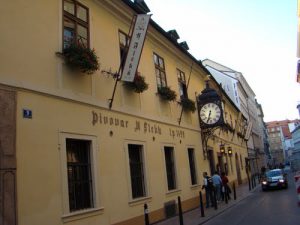 This famous microbrewery with eight lounges and a garden was established in 1499. It gets its name from owner Jakub Flekovský, who bought the building in 1762. In 1843 Flekovský dark beer made its first appearance, and the 13 percent lager is still made today. The tasty, original blend consists of water, hop, and four kinds of barley malt with brewing yeast. After being nationalized by the Communists and refurbished in the 1980s, U Fleků became independent shortly after the revolution. The place can hold up to 1,200 guests. In 1999 there was 2450 hl produced while in 2008 the number slightly decreased to 2360 hl.
This famous microbrewery with eight lounges and a garden was established in 1499. It gets its name from owner Jakub Flekovský, who bought the building in 1762. In 1843 Flekovský dark beer made its first appearance, and the 13 percent lager is still made today. The tasty, original blend consists of water, hop, and four kinds of barley malt with brewing yeast. After being nationalized by the Communists and refurbished in the 1980s, U Fleků became independent shortly after the revolution. The place can hold up to 1,200 guests. In 1999 there was 2450 hl produced while in 2008 the number slightly decreased to 2360 hl.
U Zlatého tygra beerhall
(Husova 17, Prague 1)
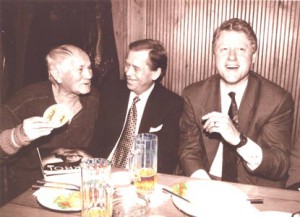 Perhaps best known as the pub frequented by legendary Czech writer Bohumil Hrabal, The Golden Tiger (U Zlatého Tygra) gets its name from the house sign of a golden tiger on its facade. The Husova 17 building harkens back to the 14th century when it was part of a palace. First, it carried the house sign of a hoe, then of a black lion. A golden tiger has adorned the facade from the early 1700s. While the building was originally built in Gothic style, it underwent Renaissance and Baroque makeovers. Regulars during the 19th century included historian František Palacký, poet Karel Hynek Mácha and dramatist Josef Kajetán Tyl. The place was lively and popular in the 1930s of the first democratic Czechoslovak Republic when it served as a reading room that made foreign journals available to the public. It was here that U.S. President Bill Clinton, Czech President Václav Havel, and Ambassador to the UN Madeleine Albright clinked glasses with Bohumil Hrabal in January of 1994. Regulars make up 90 percent of the clientele in this pub that has not lost its historic flavor and old-time atmosphere. The Golden Tiger serves Pilsner Urquell beer.
Perhaps best known as the pub frequented by legendary Czech writer Bohumil Hrabal, The Golden Tiger (U Zlatého Tygra) gets its name from the house sign of a golden tiger on its facade. The Husova 17 building harkens back to the 14th century when it was part of a palace. First, it carried the house sign of a hoe, then of a black lion. A golden tiger has adorned the facade from the early 1700s. While the building was originally built in Gothic style, it underwent Renaissance and Baroque makeovers. Regulars during the 19th century included historian František Palacký, poet Karel Hynek Mácha and dramatist Josef Kajetán Tyl. The place was lively and popular in the 1930s of the first democratic Czechoslovak Republic when it served as a reading room that made foreign journals available to the public. It was here that U.S. President Bill Clinton, Czech President Václav Havel, and Ambassador to the UN Madeleine Albright clinked glasses with Bohumil Hrabal in January of 1994. Regulars make up 90 percent of the clientele in this pub that has not lost its historic flavor and old-time atmosphere. The Golden Tiger serves Pilsner Urquell beer.



